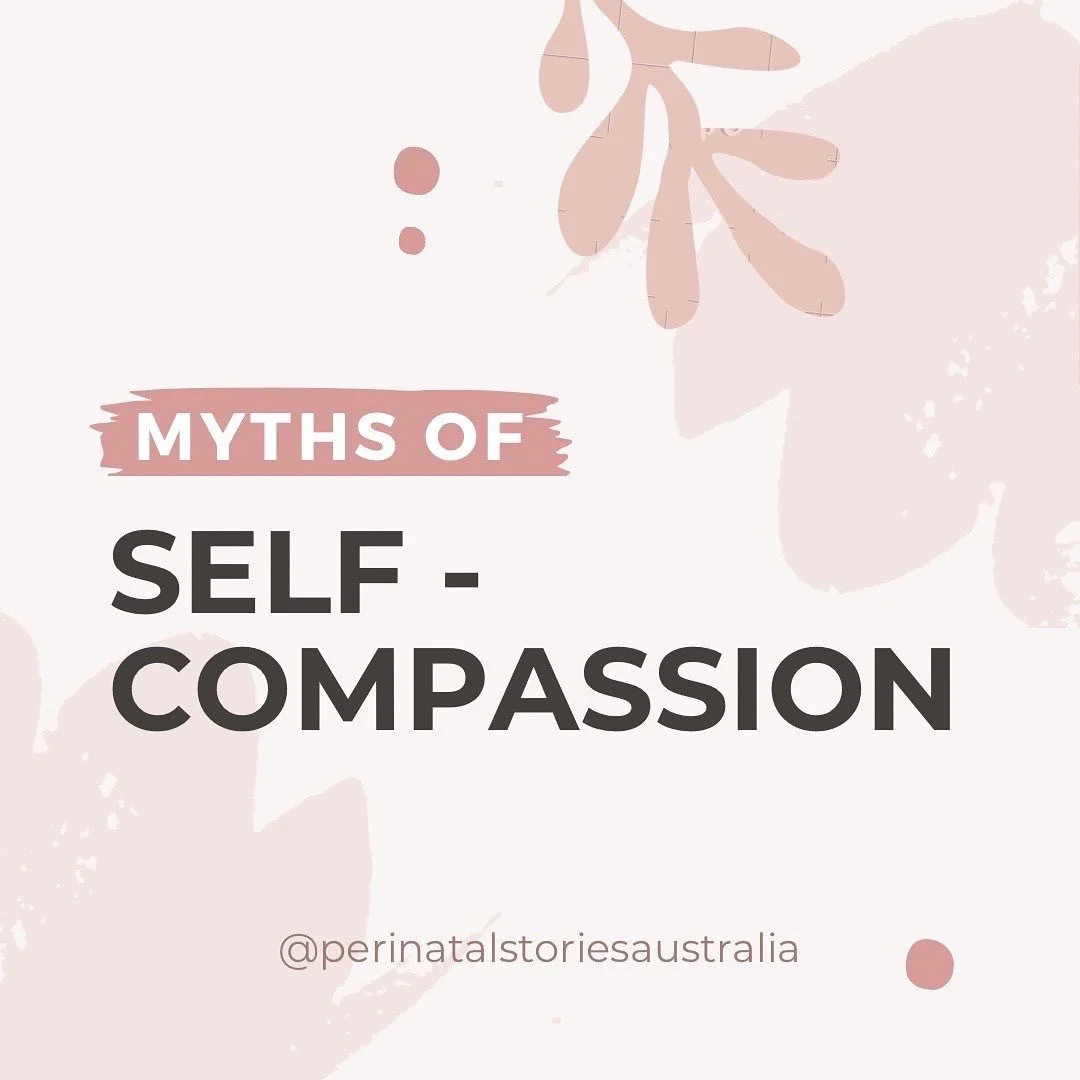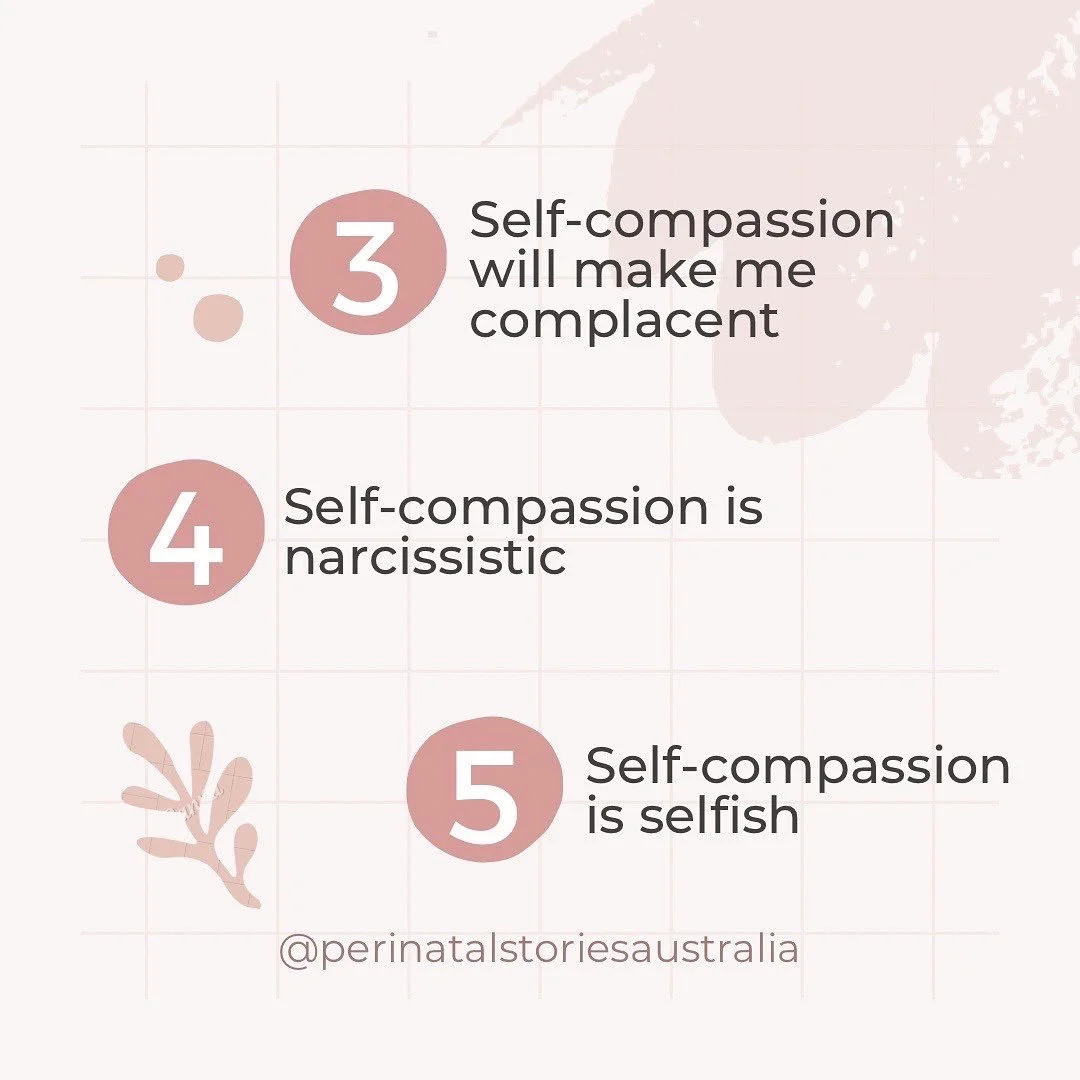5 myths about self-compassion and why it matters to mothers.
Share
Have you ever been told to “be kinder to yourself” and not known where to start? You’re not alone. For many mothers, self-compassion sounds so simple but feels incredibly hard to practice. In fact, it can feel selfish, indulgent, or even wrong. But these beliefs are myths and they keep us stuck in cycles of guilt and self-criticism. The truth is, learning how to be gentle with ourselves can transform not only how we mother, but how we care for our own mental and emotional wellbeing - which is why challenging these myths is important.
“Therapists have known for a long time that being kind to ourselves isn’t - as is too often believed - a selfish luxury, but the exercise of a gift that makes us happier. Now, finally, science is proving the point.”
What is self-compassion?
Self-compassion is the practice of treating ourselves with the same kindness, understanding, and patience that we would offer to someone we love. It’s about acknowledging our struggles and mistakes without judgment, and instead, responding with warmth and support.
Dr. Kristen Neff, a leading expert in the field and co-founder of the Center for Mindful Self-Compassion, defines self-compassion as having three key components:
self-kindness
common humanity, and
mindfulness.
While self-compassion can feel unfamiliar or difficult, especially for mothers, it’s a vital tool for improving mental health and nurturing ourselves.
Why is practicing self-compassion so hard - especially as mothers?
As mothers, we are often told to ‘be kinder’ to ourselves. It sounds so simple. But the reality is, we are mothering in a society where self-criticism is believed to be the ultimate driver of productivity and change.
We are also mothering in a context where mothering itself is so heavily scrutinised. Thanks to social media, we are subjected to an abundance of information and the dissection of our every parenting decision by strangers who reinforce what we innately know and strive against: that it doesn’t take much to be considered a ‘bad mum’.
In this context it’s easy to see why so many of us resist, or struggle with, this notion of self-compassion. How can we believe in self-compassion, let alone practice it, when compassion has never truly been modelled?
As Dr. Neff says:
“Most people don’t have any problem with seeing compassion as a thoroughly commendable quality. It seems to refer to an amalgam of unquestionably good qualities… But we seem less sure about self-compassion. For many, it carries the whiff of all those other bad “self” terms: self-pity, self-serving, self-indulgent, self-centred, just plain selfish.”
“Many people in our culture have misgivings about the idea of self-compassion, perhaps because they don’t really know what it looks like, much less how to practice it.”
These misgivings, or myths, about self-compassion also keep us trapped in self-critical patterns - the last thing mothers need.
So what exactly are these myths and misgivings holding us back?
What are the common myths about self-compassion?
“Self-compassion is a form of self-pity.”
It’s a common misconception that self-compassion is the same as self-pity. In reality, self-compassion is an antidote to self-pity.
Research shows that practicing self-compassion helps you avoid becoming consumed by self-pitying thoughts. Instead, it encourages perspective-taking and fosters a deeper connection with others.
Instead of getting stuck difficult emotions, self-compassion allows you to gently acknowledge them, learn from them, and move forward with greater resilience.
“Self-compassion means weakness.”
Another myth is that self-compassion is a sign of weakness. This couldn’t be further from the truth.
In fact, self-compassion is one of the most powerful tools for building resilience and coping. Studies consistently show that those who practice self-compassion are better equipped to cope with stress and setbacks.
Rather than giving in to self-criticism or feelings of inadequacy, self-compassion empowers you to confront challenges with strength and grace.
“Self-compassion makes me complacent.”
Some believe that showing kindness to yourself will make you complacent or lazy. However, research suggests the opposite.
It might surprise you to know that self-compassion is actually a more effective motivator than self-criticism. According to Dr. Kristen Neff:
“Self-compassion engenders a learning and growth orientation that improves performance.”
Far from holding you back, self-compassion helps you develop the mindset needed to overcome challenges and pursue personal growth.
“Self-compassion is narcissistic.”
Self-compassion is often misunderstood as narcissism, but it’s actually quite the opposite.
Rather than being self-centered, self-compassion is rooted in the recognition that all humans are imperfect and worthy of kindness. It allows you to relate to others with empathy and understanding, acknowledging that everyone has struggles and challenges.
Far from fostering narcissism, self-compassion nurtures connection and compassion for others.
“Self-compassion is selfish.”
One of the most common myths is that practicing self-compassion is selfish. In truth, being kind to yourself can make you more compassionate toward others.
Dr. Neff’s research highlights that:
“Self-compassionate people are more giving and supportive to others in relationships. Professional and family caregivers are more able to care for others without becoming drained and burned out.”
Far from being selfish, self-compassion strengthens our ability to care for ourselves and those around us and allows us to sustain this care we give without running on empty. This means that rather than depleting us, self-compassion replenishes the energy we need to parent, connect, and cope. And even if it is a little selfish, perhaps that’s not such a bad thing. Tending to our own needs isn’t a sign of self-absorption. It’s a healthy, and necessary, part of being human - especially in the demanding role of motherhood.
Why busting self-compassion myths matters for mothers?
Motherhood is often portrayed as a role of selflessness, where personal needs are put aside in favor of caring for others. Many mothers carry a quiet but constant feeling of being not enough. We often feel like we should be doing more, being more, and chasing an invisible standard of ‘perfect parenting’ that simply doesn’t exist.
I speak for myself, and likely for many other mothers, when I say that self-doubt creeps in daily.
Am I doing this right?
Am I doing enough?
Am I enough?
This pressure to always be ‘more’ as a parent is relentless - and it’s exhausting, not to mention unsustainable. It contributes to anxiety, overwhelm, and burnout, particularly for mothers already facing mental health challenges. And because we live in a culture that rewards self-sacrifice and critiques every parenting decision, the idea of being kind to ourselves can make us feel uncomfortable or guilty, even selfish.
In your words.
“It's hard enough being a new mum or an experienced mum, let alone one who has to battle their own mind over things. So, give grace to yourself, be kind to yourself.”
But this is exactly where self-compassion matters most.
Self-compassion is not a luxury. It’s a protective tool for our mental and emotional wellbeing, and an antidote to the unrelenting pressure of perfectionism and constant scrutiny of mothering in our modern world.
Busting the myths surrounding self-compassion is essential for breaking these cycles of guilt and self-criticism. When mothers learn that self-compassion isn’t selfish but rather a necessary part of mental and emotional health, it opens the door to healthier parenting and greater self-acceptance.
In fact, according to Dr. Kristen Neff:
“A growing body of research literature is demonstrating conclusively that self-compassion is not only central to mental health, but can be enriched through learning and practice, just like so many other good habits. Therapists have known for a long time that being kind to ourselves isn’t - as is too often believed - a selfish luxury, but the exercise of a gift that makes us happier. Now, finally, science is proving the point.”
It’s not about ‘letting ourselves off the hook’. It’s about meeting ourselves with understanding in the moments everything feels too much. It gives us the space to pause, breathe, and respond - rather than react - when life feels overwhelming. For mothers facing a perinatal mental illness or simply the everyday load of caregiving, it can be the steady hand on our shoulder when we need it most.
Challenging the myths that surround self-compassion helps us reclaim our worth - not because we’re perfect, but because we’re human. It allows us to break free from guilt, respond to our needs without shame, build emotional capacity, better manage stress, recover from setbacks, approach our children with more patience and empathy, and model emotional resilience for our children. When mothers model self-compassion, it creates a ripple effect that benefits the whole family.
Moreover, when we learn to treat ourselves with the same kindness we give to others, we don’t just survive motherhood - we begin to heal, grow, and connect to others with more presence and peace.
You deserve kindness too
Motherhood is demanding - emotionally, mentally, and physically. And for those living with anxiety, depression, or overwhelm, it can feel even harder. In this landscape, self-compassion isn’t selfish or indulgent. It’s essential.
Remember…
You are already enough - exactly as you are. You don’t need to earn your own kindness.
By letting go of myths that tell us we must be perfect, strong, or selfless at all times, we create space to breathe, to feel, and to heal. We begin to believe that our worth isn’t measured by how much we do, but by our very being.
It’s time to challenge the myths about self-compassion. It’s time to embrace our common humanity. And it’s time to see ourselves as worthy of kindness - not just when or if we achieve, but just because.
Do you hold onto any of the myths that keep you trapped in self-critical or self-punishing thought patterns?
SOURCES
Kristin Neff, PhD. “The 5 Myths of Self-Compassion: What Keeps Us from Being Kinder to Ourselves?” Psychotherapy Networker, 2015.
Kristin Neff, PhD. “What is Self-Compassion?” Self-Compassion.org, 2024.
This blog is informed by lived experience and is not intended as medical advice.
If you or someone you know needs support, Perinatal Stories Australia encourages you to reach out to Lifeline (13 11 14), 13YARN (13 19 76), or Suicide Callback Service (1300 659 467).























